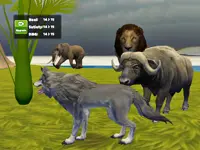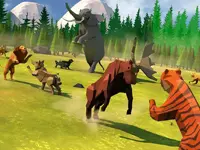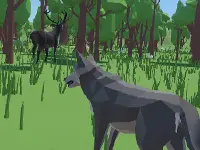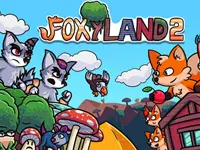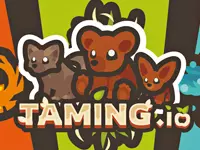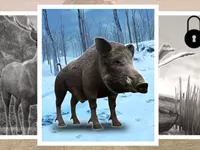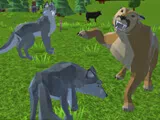What are Wolf 🐺?
If you have a fascination for wild animals, you'll be delighted to discover the latest wolf games available. Immerse yourself in the thrilling world of werewolves, simulation games that allow you to witness the evolution of wolves and experience the joy of raising wolf cubs within a virtual environment. These games offer an immersive 3D simulator experience, where you can explore vast virtual worlds, honing your hunting skills as part of a powerful wolf pack. Embark on quests, engage in strategic battles, and strive to become the mighty alpha wolf. To indulge in the most realistic and visually stunning wolf experiences, you can explore our category of free animal games online on Brightestgames. These WebGL games offer a remarkable level of realism and provide an engaging and captivating gaming experience for all wolf enthusiasts. Prepare yourself for an unforgettable adventure in the wild as you embody the essence of the wolf, experiencing its strength, agility, and cunning nature. 🔄Category Edited/Updated on 04.02.2025
Wolf 🐺 Games
- BrightestGames.com
- Animal
-
Wolf 🐺 Games
Wolf 🐺 Games
What Are Wolf Games?
🐺⚔️ 💪Wolf games typically refer to online or video games that revolve around the theme of wolves. These games often allow players to take on the role of a wolf or interact with wolves as a central element of gameplay. Learn all there is to know about the exciting world of werewolves. You may experience the thrill of parenting wolf puppies and watching them grow in these simulation games. In these games, you may train your hunting abilities as a member of a formidable wolf pack in a realistic 3D environment. Take on missions, fight in skirmishes of strategy, and work your way up to the position of the alpha wolf. Browse our free online animal games on Brightestgames for the most lifelike and aesthetically amazing wolf encounters. Here are a few key aspects and examples of wolf games:
1. Wolf Simulation Games: These games simulate the life of a wolf in a virtual environment. Players can explore a realistic or fantasy-based world, complete quests or missions, establish packs, hunt for food, raise wolf pups, and engage in various wolf behaviors and activities.
Example: "WolfQuest" is a popular wolf simulation game that offers a realistic depiction of wolf life in the wild. It allows players to create and customize their wolf characters, hunt prey, establish territories, and interact with other players in a multiplayer mode, or just try out the Wolf Vs Tiger Simulator Wild Animals 3D game.
2. Wolf RPGs: Role-playing games (RPGs) centered around wolves often provide a narrative-driven experience. Players assume the role of a wolf character and embark on quests, engage in battles or challenges, develop relationships with other characters, and progress through a story or a world filled with wolf-related themes.
Example: "Okami" is an action-adventure RPG where players control Amaterasu, a wolf goddess who embarks on a quest to restore nature and defeat evil forces. The game combines exploration, combat, and puzzle-solving in a visually stunning, Japanese-inspired world. Also, you can explore and play online ''Wild Wolves'' here on our website!
3. Wolf-themed Online Multiplayer Games: Some online multiplayer games incorporate wolves as playable characters or as a prominent feature. These games may offer various gameplay modes, including cooperative or competitive play, and allow players to interact and engage with others in a wolf-centric virtual world.
Example: "Don't Starve Together" is a multiplayer survival game where players can choose to play as the character "Wolfgang," who has wolf-like abilities and attributes. Players must work together to survive in a challenging and hostile environment; you can find more about this game in this online wolf game called Wolf Simulator: Wild Animals 3D.
4. Educational and Learning Games: Educational games are designed to provide knowledge about wolves, their behavior, and their role in ecosystems. These games aim to educate players about conservation, wildlife, and the importance of preserving wolf populations. Example: "WolfQuest: Anniversary Edition" is an updated version of the aforementioned wolf simulation game. It includes educational elements, teaching players about wolf ecology, biology, and conservation efforts. Wolf games can offer players a chance to explore the world through the eyes of a wolf, experience their behaviors, and engage with wolf-related themes. They often combine adventure, simulation, and role-playing elements, providing an immersive and educational experience for those interested in wolves and their natural habitat.
Are Wolf Games Online Safe For Kids?
The safety of online wolf games, or any online games, for kids, depends on various factors, including the specific game, the platform it is played on, and the child's age and maturity level. It's essential for parents or guardians to consider the following aspects to ensure a safe gaming experience for kids:
- Age Ratings and Content: Check the age rating and content descriptors provided for the game. These ratings are usually assigned by organizations like the Entertainment Software Rating Board (ESRB) and guide the appropriate age group for which the game is intended. Make sure the game is suitable for your child's age.
- Parental Controls and Privacy Settings: Familiarize yourself with the parental control options available on the gaming platform or within the game itself. These settings allow you to limit or monitor your child's interactions, restrict access to certain features, and ensure their online safety. Additionally, review the privacy policies of the game and platform to understand how personal information is handled.
- Online Interactions: Some wolf games may include online multiplayer features that allow players to interact with others. Pay attention to the game's community guidelines and communication features. If the game involves chat functions, consider whether you are comfortable with your child interacting with other players and whether you can monitor or restrict those interactions.
- In-app purchases: Be aware of in-app purchases within the game. Some games may offer additional content, items, or currency that can be purchased with real money. Ensure that you have appropriate controls to prevent accidental or unauthorized purchases.
- Game Reviews and Recommendations: Before allowing your child to play a specific wolf game, read reviews and seek recommendations from other parents or trusted sources. This can provide insight into the game's appropriateness, content, and potential safety concerns.
- Supervision and Communication: It is generally advisable for parents or guardians to supervise their child's online gaming activities, especially for younger children. Engage in open communication with your child about their gaming experiences, set limits on screen time, and encourage responsible and safe gaming habits.
- Remember that every child is different, and what may be suitable for one child may not be suitable for another. Evaluating the game's content, features, and potential risks is essential to make an informed decision regarding its appropriateness for your child.
- Lastly, staying involved and maintaining an ongoing dialogue with your child about their online activities can help ensure their safety and guide them in making responsible choices while playing wolf games or other online games.
Any Tips For Playing Wolf Games Online?
Here are some tips to enhance your gameplay experience in wolf games online:
Understand Game Mechanics: Take the time to familiarize yourself with the game mechanics, controls, and objectives. Read the game's tutorials or instructions to understand how to navigate the game world, perform actions, and interact with other characters or elements.
Explore the Game World: Take advantage of the game's exploration aspect. Take your time to explore the virtual world and discover hidden areas, collectibles, or quests. This allows you to immerse yourself in the game's environment and uncover new experiences or rewards.
Complete Quests and Objectives: Engage with the game's quests, missions, or objectives. They often guide and structure your gameplay experience, leading to story progression or unlocking new features. Completing quests can reward you with experience points, items, or character upgrades.
Customize Your Wolf: Personalize your wolf character if the game allows customization. Customize its appearance, such as fur color, markings, or accessories, to make it unique and reflect your style. This adds a personal touch to your gameplay experience.
Master Wolf Abilities: Learn and utilize your wolf character's unique abilities or skills. These abilities can vary depending on the game. Still, they may include enhanced senses, speed, strength, or special attacks practice using these abilities effectively to gain an advantage in combat or other challenges.
Hunt and Gather: Hunting and gathering are vital in wolf games, emphasizing survival or simulation. Learn the hunting mechanics, study prey behaviors, and employ strategic approaches to secure food and resources for your wolf and pack.
Interact with Pack or Other Players: If the game includes pack mechanics or multiplayer features, consider interacting with other players or AI-controlled pack members. Cooperation and coordination can enhance your gameplay experience, allowing you to tackle challenges or engage in social interactions.
Upgrade and Progress: If the game offers progression systems or character development, prioritize upgrades that align with your preferred playstyle. Enhance your wolf's abilities, unlock new skills, or increase attributes that complement your preferred gameplay approach.
Participate in Community Events: Watch for events or special in-game activities. These events often provide unique rewards, additional quests, or limited-time content. Participating in these events can add variety to your gameplay and allow you to engage with the game's community.
Enjoy the Immersion: Lastly, embrace the immersive experience of Wolf games. Immerse yourself in the game's world, appreciate the visuals, sounds, and storytelling, and enjoy the unique perspective of playing as a wolf. Let yourself be captivated by the game's atmosphere and immerse yourself in the role of your wolf character. Remember always to prioritize responsible gaming habits, maintain a healthy balance with other activities, and follow any community guidelines or rules set by the game to ensure an enjoyable and safe gaming experience, just like in this Wolf Gun!
What Is A Wolf?
A wolf is a large carnivorous mammal belonging to the family Canidae, which also includes dogs, foxes, and other similar animals. The most well-known species is the gray wolf (Canis lupus), which is the largest member of the Canidae family. Here are some key details about wolves:
Physical Characteristics
Size and Appearance: Wolves are typically large, with males weighing between 80 and 100 pounds (36 to 45 kilograms) on average, though some can be larger. They have long legs, bushy tails, and thick fur that can range in color from gray to white, black, or brown.
Adaptations: Wolves are built for stamina and strength. Their powerful jaws and sharp teeth are adapted for hunting and eating meat. Their keen senses of smell and hearing help them track prey over long distances.
Behavior And Social Structure
Pack Dynamics: Wolves are highly social animals that live in packs, which are typically family units consisting of a breeding pair (the alpha male and female) and their offspring. Pack sizes can range from a few individuals to over a dozen.
Communication: Wolves communicate through vocalizations like howls, body language, and scent marking. Howling helps pack members locate each other and can serve as a warning to other wolves.
Territory: Wolves are territorial animals. They establish territories through scent marking and vocalizations, defending them from other wolves.
Habitat And Distribution
Range: Historically, wolves were found throughout the Northern Hemisphere, but their range has been reduced due to habitat destruction and persecution. Today, they primarily inhabit parts of North America, Europe, Asia, and the Middle East.
Habitats: Wolves can adapt to a variety of habitats, including forests, tundras, grasslands, and deserts. They require a territory large enough to support their need for prey.
Diet And Hunting
Carnivorous Diet: Wolves primarily hunt large ungulates like deer, elk, and moose, but they will also eat smaller animals, carrion, and sometimes even fruit.
Hunting Techniques: Wolves hunt in packs and use coordinated strategies to bring down large prey. They rely on their speed, endurance, and teamwork to tire out and capture animals.
Conservation Status
Threats: Wolves face threats from habitat loss, human conflict, and hunting. In many areas, they have been extirpated or their populations have significantly decreased.
Conservation Efforts: Efforts to conserve and reintroduce wolves in certain areas have been successful in restoring populations, highlighting the importance of these apex predators in maintaining ecological balance.
Cultural Significance
Mythology and Symbolism: Wolves have been prominent in mythology and folklore across various cultures. They are often seen as symbols of wilderness, power, and freedom but have also been viewed with fear and misunderstanding.
Wolves play a crucial role in their ecosystems by regulating prey populations and helping maintain the health of their habitats. Despite challenges, they continue to be a focus of conservation efforts and scientific study due to their ecological importance and complex social behavior.
Frequently Asked Questions (FAQ) For Wolf Games On BrightestGames
1. What are wolf games? Wolf games are online games that feature wolves as main characters. These games may involve survival challenges, pack management, hunting simulations, or adventure quests.
2. Are the wolf games free to play?
Yes, all wolf games on BrightestGames are free to play. Some may include optional in-game purchases or ads to support the developers.
3. Do I need to download Wolf games?
No, most wolf games on BrightestGames are browser-based and do not require downloads. However, some advanced games may require additional plugins or software.
4. Can I play wolf games on mobile devices?
Many wolf games on BrightestGames are mobile-friendly and can be played on smartphones and tablets. Check the game description to see if it's compatible with your device.
5. Do these games have multiplayer options?
Some wolf games offer multiplayer modes where you can interact with other players in an online world. Look for "multiplayer" in the game’s description.
6. How do I control the wolves in the game?
Controls vary by game, but most use the keyboard (WASD or arrow keys for movement) and mouse for actions. Touch controls are available for mobile-friendly games.
7. Are there any educational wolf games?
Yes, some wolf games focus on wildlife conservation, ecosystem management, and real-life wolf behaviors, making them both fun and educational.
8. What should I do if a game is not loading?
Try the following steps:
- Refresh the page
- Clear your browser cache
- Update your browser
- Disable ad-blockers
- Try a different browser
If the issue persists, contact BrightestGames support.
9. Are these games appropriate for children?
Most wolf games are suitable for all ages, but some may contain challenging gameplay or mild hunting mechanics. Check the game rating and description before playing.
10. How can I suggest adding a new wolf game?
You can suggest new games by contacting BrightestGames through the support page or social media channels.
What Are The Best Mobile, Tablet, And iPhone Wolf Games To Play In 2025?



